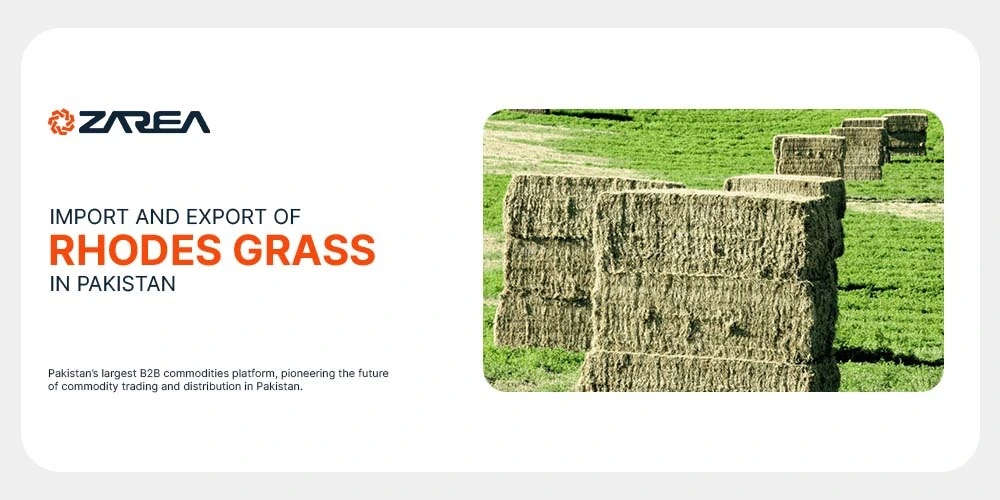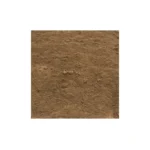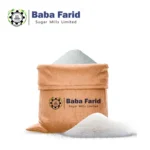Introduction – Rhodes Grass in Pakistan:
As you know, Pakistan’s agricultural sector plays an important role in order to run the country’s economy. On the other hand Rhodes grass has been considered as a significant forage crop in the agricultural industry. People farm Rhodes grass for its exceptional productivity, drought resistance, and excellent nutritional benefits. So, this industry view it as a lucrative export opportunity and they also make it more popular for livestock feed. Meanwhile we are highlighting its significance, market potential, and future outlook. That’s why this blog will provide you with a detailed examination of the import and export pattern of Rhodes grass in Pakistan.
This grass serves as an excellent source of forage for both pasture and hay, demonstrating high productivity. When young, it is of superior quality. The export of Rhodes grass from Pakistan is mainly recognized for its high-quality forage. This enhances the overall quality of Rhodes grass farming in Pakistan and boosts the yield per acre.
What is Rhodes Grass?
Rhodes grass, also called (Chloris gayana), is a tropical perennial grass that grows well in arid and semi-arid climates. It thrives in a variety of soil types and can withstand protracted dry spells. This is the reason thats farmers happily farm it for hay and grazing purposes. Meanwhile this grass contains high levels of protein and digestible fiber which makes it appropriate for livestock like cattle, goats, and sheep.
Rhodes Grass Farming in Pakistan:
A recent report revealed that Pakistan has a thriving industry market for livestock and dairy producers. That’s why livestock numbers grow at a rate of 4.2% EACH YEAR. That’s the reason behind the huge feed demand on the market. At present, it yields nearly 51.92 million tons of forage annually. While the area allocated to different forage crops in the nation spans about 2.31 million hectares. This extensive forage farm mainly focuses on local forage vendors and wholesalers. On the other hand, hay exporters and dairy farmers are also included in this category. Modern methods address all these elements. Our agricultural operations make use of imported hybrid seeds of this grass and use advanced harvesting machinery provided by Farm Dynamics in Pakistan. Here are several components of our sophisticated processing that utilize contemporary technology.
Cultivation of Rhodes Grass in Pakistan:
Pakistan’s good climate especially in the Punjab, Sindh, and Balochistan regions is ideal for Rhodes grass cultivation. Meanwhile this crop is harvested several times per year and requires an average amount of attention. These qualities make Rhodes Gras popular choice among farmers. Meanwhile in recent years, government efforts and educational initiatives have accelerated its development.
Production of Bale from Rhodes Grass
Bales are made from cured hay. The baler gathers strips of natural and cultivated grass or straw, compacts the grass into rectangular bales, and ties them with rope. The bales are kept and delivered based on customer requests.
Export Opportunities for Rhodes Grass:
Over the past decade, Pakistan has become a major exporter of Rhodes grass, primarily to Gulf countries such as Saudi Arabia, Oman, and the United Arab Emirates. Due to their limited agricultural land and water scarcity, these nations are forced to import animal feed.
Key Export Insights:
Strong Demand in the Middle East: The growth of livestock farming combined with insufficient local forage production drives this requirement.
Promoting Export Policies: The government supports agricultural exports by granting subsidies, simplifying certification processes, and providing trade assistance.
Excellent Quality and Competitive Rates: The global market recognizes Pakistani Rhodes grass for its high quality and competitive prices.
Key Points on Rhodes Grass Importation:
Although farmers may import specific varieties for breeding or to increase genetic diversity, Pakistan primarily produces enough Rhodes grass on its own. To stop diseases and pests from entering the country, authorities usually impose strict phytosanitary regulations and limit these imports.
Economic Impacts:
The export of Rhodes grass in Pakistan contributes positively to the economy by:
- Increasing farmers’ earnings by facilitating entry to global markets.
- Creating employment opportunities in agriculture, packaging, and logistics.
- Increasing foreign currency income.
Difficulties in Exporting Rhodes Grass:
The Rhodes grass export industry faces multiple challenges even with its potential:
- Logistics and Transportation: Correct management, baling, and shipping are vital to maintain quality during the trip.
- Quality Control: Achieving international quality benchmarks requires continuous monitoring and improvement.
- Regulatory Obstacles: Exporters often encounter different policies and tariff structures.
Zarea’s Contribution to Boosting Agricultural Exports:
Zarea can revolutionize the industry by connecting farmers and exporters to reliable markets, current pricing, logistical assistance, and digital payment options. By digitizing the agricultural supply chain, Zarea enhances transparency, efficiency, and quality control in its export operations.
Final Thoughts:
In Pakistan, Rhodes grass has transitioned from a specialized forage crop to an important export good that provides considerable economic advantages. Ongoing government backing, investments in quality improvement, and digital platforms such as Zarea enable trade, positioning the market for importing and exporting Rhodes grass for expansion. Zarea strives to enhance its agricultural exports, viewing Rhodes grass as an important resource for rural growth and economic stability. Exporters of Rhodes grass in Pakistan are becoming some of the biggest globally. The quality of Rhodes grass found in Pakistan excels compared to that of other nations. Nevertheless, locating suppliers of Rhodes grass seeds can be difficult, which frequently impacts the cost of Rhodes grass.
FAQ’s:
What is the name of Rhodes grass in Pakistan?
The perennial Rhodes grass, scientifically known as Chloris gayana, thrives in the summer and spreads by runners, providing good soil coverage to stop erosion. This tropical grass is commonly found by researchers in tropical and subtropical areas, such as Bangladesh, India, and Pakistan.
Which grass is good for lawn in Pakistan?
Bermuda is the preferred option for grass. If you encounter the Yukon type of Bermuda Grass, it’s an excellent choice since it provides improved cold resistance.
What is the yield of Rhodes grass per acre in Pakistan today?
How much Rhodes grass does Pakistan produce on average per acre? Rhodes grass yields in Pakistan typically range from 2 to 4 tons per acre, though this can vary depending on a number of factors.
What is the benefit of Rhodes grass?
Rhodes grass is an excellent choice for either a permanent pasture or a short-term pasture solution. Its expansive growth aids in effectively preventing erosion. When collected at or just prior to early flowering, it yields high-quality hay and provides better standover feed than buffel grass or panic grasses.

































